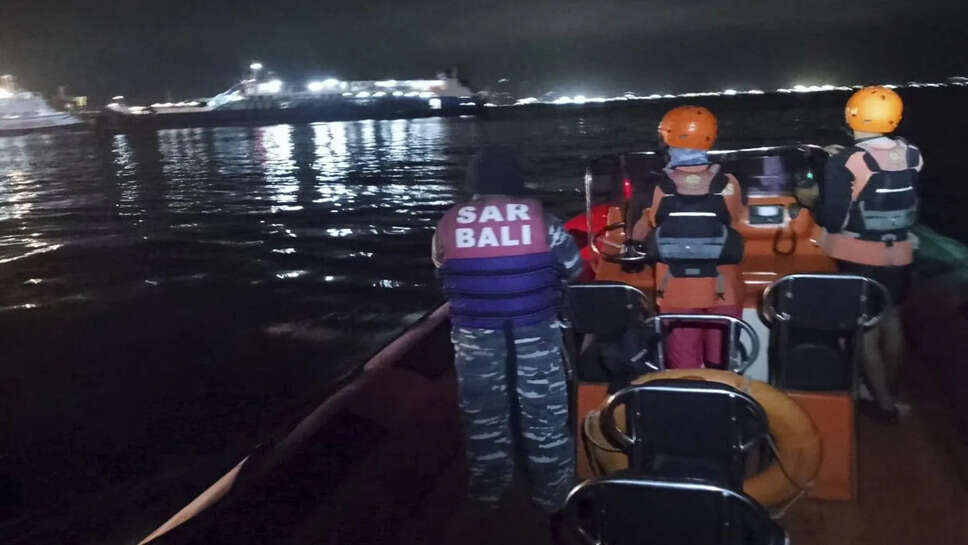Disaster at Sea: Indonesian Boat Capsizes Near Mentawai, Rescue Operations Ongoing

A routine sea voyage turned into a desperate search-and-rescue mission after a boat carrying passengers and crew capsized off the coast of Indonesia’s Mentawai Islands. The incident, which occurred in the early hours of the morning, has left at least 11 people missing, as local authorities rush to locate survivors in the vast, often unpredictable waters of the Indian Ocean.
Initial reports from local disaster officials indicate that the vessel, which was traveling between islands in the West Sumatra province, encountered rough seas before capsizing. While several passengers were rescued by nearby fishermen and coast guard teams, the fate of 11 individuals remains uncertain as search operations continue.
The Incident: A Sudden Turn of Events
The vessel, reportedly a medium-sized wooden boat often used for inter-island transport, had set off under fair conditions. But weather patterns in the Mentawai Strait are notoriously volatile. Rough seas and high waves are common, particularly during seasonal transitions, and it appears the boat was caught in a sudden swell that overturned it.
Eyewitness accounts from rescued passengers describe a harrowing scene. “The waves came quickly and without warning. We felt the boat lurch, and before we knew it, it flipped,” said one survivor, who was pulled from the water after clinging to floating debris for over an hour.
The boat was not registered as a commercial ferry, which has raised questions about safety compliance and whether it was equipped with enough life vests or emergency equipment.
Search and Rescue Underway
Indonesia’s National Search and Rescue Agency (Basarnas) immediately deployed multiple teams to the area following reports of the incident. Naval personnel, divers, and local fishing boats have joined the effort, using sonar equipment, speedboats, and aerial drones to scan the waters.
As of now, challenging weather and strong currents are hindering the operation. The area where the boat capsized is known for underwater turbulence and shifting tides, which could potentially push survivors or debris miles from the original site.
“We are using all resources available, including aerial surveillance and maritime patrols,” said a spokesperson from Basarnas. “Our priority is to locate any survivors as quickly as possible, while also retrieving bodies if necessary.”
So far, the exact number of passengers on board remains unclear due to the informal nature of the voyage. Some survivors report around 20 people aboard, while others estimate more than 25, making it difficult for authorities to confirm the total count.
Family Members Await News
As news of the incident spread, families of the missing gathered at local ports, seeking information and holding on to hope. Tearful relatives described last-minute phone calls and goodbyes before the journey began—communications now seared with tragic uncertainty.
“I spoke to my son before he boarded. He said the sea looked calm. Now I don’t know if I’ll ever see him again,” said one distraught mother, waiting at the dockside with photos in hand.
Authorities have established an information center at the nearest port, providing updates and collecting DNA samples in case bodies are recovered. Counselors and local religious leaders are also on hand to provide emotional support to grieving families.
Recurring Concern: Maritime Safety
Indonesia, the world’s largest archipelagic nation, depends heavily on sea transport. Boats and ferries serve as lifelines for millions of people traveling between the country’s more than 17,000 islands. However, maritime accidents remain frequent, often linked to lax regulations, overloading, poor weather forecasting, or inadequate safety measures.
Just last year, another fatal accident in nearby waters claimed the lives of 14 people, prompting fresh calls for stricter safety protocols and better enforcement. Despite these repeated tragedies, improvements have been slow, especially among informal and non-commercial boat operators.
The Indonesian government has been working to modernize maritime infrastructure and promote better safety training, but isolated incidents like the Mentawai capsizing show how much work remains.
“This cannot keep happening,” said a spokesperson from the Indonesian Transportation Safety Committee. “Every accident must be investigated thoroughly, and clear accountability must follow.”
Mentawai Islands: A Treacherous Beauty
The Mentawai Islands are famed globally for their surfing destinations, remote beaches, and tribal cultures. But beneath their tropical allure lies a history of maritime risk. Isolated by strong currents and sparsely patrolled, these waters are known for swallowing vessels during stormy seasons.
For locals, traveling by boat is not a luxury but a necessity. Boats ferry villagers between islands for schooling, work, medical care, and market trade. In many cases, these are small, privately operated vessels with little to no government oversight.
As such, when tragedy strikes, it hits the heart of everyday life—not just tourists or commercial passengers, but entire communities.
Next Steps: Investigation and Reform
Authorities have confirmed that an investigation will follow once the immediate rescue phase ends. Officials will probe whether the boat was overloaded, if the captain had weather clearance, and whether emergency measures were followed appropriately.
Marine officials have also called for a renewed push to regulate informal sea travel and implement better early-warning systems, especially in high-risk zones like the Mentawai region.
In the meantime, local fishermen have continued assisting rescue teams, scouring the waters in small boats and watching for floating signs of life.
“This sea has fed us for generations,” said a fisherman who helped pull two survivors to safety. “But today, it has taken too much. We won’t stop searching until we find the rest.”
Hope Amid Uncertainty
As hours turn into days, the chances of finding all missing passengers alive diminish—but rescue workers remain cautiously optimistic. Survivors in previous Indonesian capsizing incidents have been found after 48 hours or more, clinging to debris or washed ashore.
Still, time is of the essence. Hypothermia, dehydration, and injury pose serious threats the longer someone remains lost at sea.
Meanwhile, communities across West Sumatra have begun organizing prayers, vigils, and support drives. In the small fishing villages lining the Mentawai coast, lanterns flicker through the night as boats continue to comb the waves—searching for signs of those who still haven’t returned.
